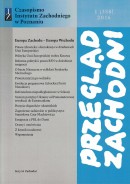Bitwa pod Grunwaldem – sześć wieków narodowej pamięci
Battle of Grunwald - six centuries of national memory
Author(s): Marceli KosmanSubject(s): History
Published by: Instytut Zachodni im. Zygmunta Wojciechowskiego
Summary/Abstract: One of the biggest battles of medieval Europe belongs to the leading events in the history of Poland, as it effectively curbed the aggression of the Teutonic Order on the Baltic seacoast. With sword and fire, under the banner of the cross, the Order had established its own state on those lands threatening the Piast Poland. For centuries the Germans perceived this defeat as an end of their ‘‘civilizational mission’’ and only towards the end of the 20th century they re-evaluated their judgment, their position approaching that of Polish historiography. The defeat of 1410 was compensated for in propagandist terms with a ‘‘second Tannenberg’’, i.e. a defeat of the Russians on the same site during the First World War. In pre-partition Poland (until 1795) and especially during the reign of the Jagiellonian dynasty, the anniversaries of the victory were celebrated as church and state holidays. In times of national captivity they served the idea of national survival and could be freely celebrated only from the third quarter of the 19th century in the part annexed by Austria, after Galicia had gained autonomy. The 500th anniversary was celebrated on a grand scale in Krako´w with the participation – partly in conspiracy – of delegations from the Prussian and Russian partitions. Jubilee celebrations were held on the 550th anniversary (1960) and the 600th anniversary (2010) when the battlefield was within the territory of the Polish state. The character of the celebrations changed as they no longer needed to serve the idea of ‘‘cheering up the hearts’’. Recently the anniversaries lost their confrontational edge in shaping the image of Polish-German relations.
Journal: Przegląd Zachodni
- Issue Year: 336/2011
- Issue No: 01
- Page Range: 105-130
- Page Count: 26
- Language: Polish

